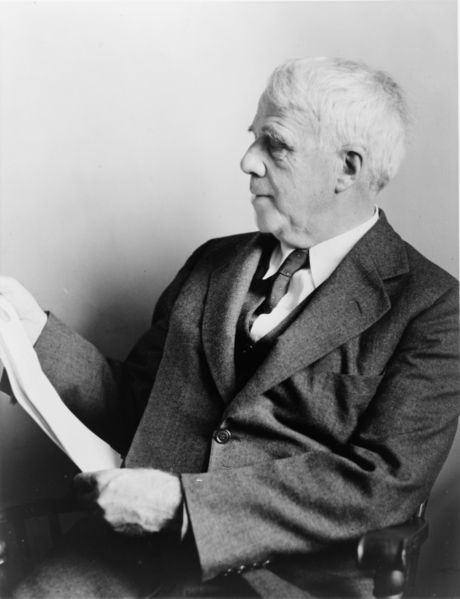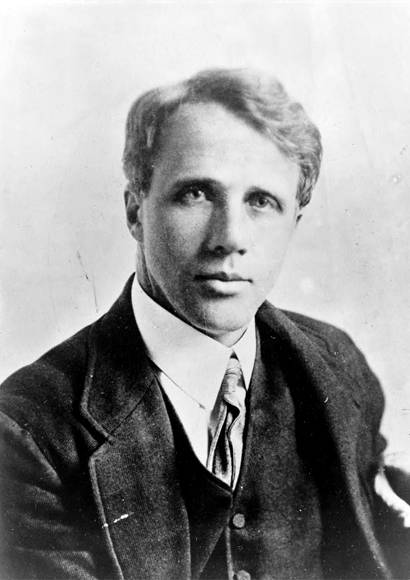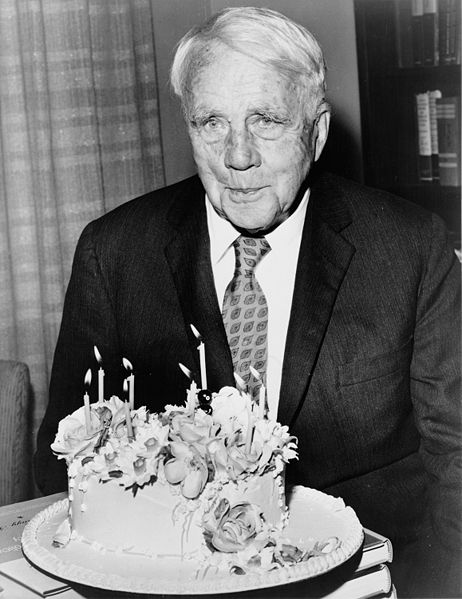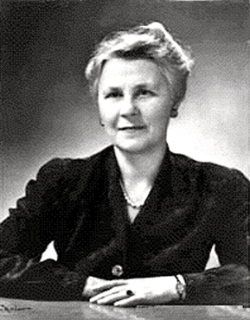<Back to Index>
- Poet Robert Lee Frost, 1874
- Cofounder of Al-Anon Lois Wilson, 1891
PAGE SPONSOR



Robert Lee Frost (March 26, 1874 January 29, 1963) was an American poet. He is highly regarded for his realistic depictions of rural life and his command of American colloquial speech. His work frequently employed settings from rural life in New England in the early twentieth century, using them to examine complex social and philosophical themes. One of the most popular and critically respected American poets of his generation, Frost was honored frequently during his lifetime, receiving four Pulitzer Prizes for Poetry.
Robert Frost was born in San Francisco, California, to journalist William Prescott Frost, Jr., and Isabelle Moodie. His mother was of Scottish descent, and his father descended from Nicholas Frost of Tiverton, Devon, England, who had sailed to New Hampshire in 1634 on the Wolfrana.
Frost's father was a teacher and later an editor of the San Francisco Evening Bulletin (which later merged with the San Francisco Examiner), and an unsuccessful candidate for city tax collector. After his death on May 5, 1885, the family moved across the country to Lawrence, Massachusetts, under the patronage of (Robert's grandfather) William Frost, Sr., who was an overseer at a New England mill. Frost graduated from Lawrence High School in 1892. Frost's mother joined the Swedenborgian church and had him baptized in it, but he left it as an adult.
Although known for his later association with rural life,
Frost grew up in the city, and he published his first poem
in his high school's magazine. He attended Dartmouth
College for two months, long enough to be accepted into
the Theta Delta Chi fraternity. Frost returned home to
teach and to work at various jobs including helping his
mother teach her class of unruly boys, delivering
newspapers, and working in a factory as an arclight carbon
filament changer. He did not enjoy these jobs, feeling his
true calling was poetry.
In 1894 he sold his first poem, "My Butterfly. An Elegy" (published in the November 8, 1894, edition of the New York Independent) for $15 - equivalent in spending power to at least $300 today. Proud of his accomplishment, he proposed marriage to Elinor Miriam White, but she demurred, wanting to finish college (at St. Lawrence University) before they married. Frost then went on an excursion to the Great Dismal Swamp in Virginia and asked Elinor again upon his return. Having graduated, she agreed, and they were married at Lawrence, Massachusetts, on December 19, 1895.
Frost attended Harvard University from 1897 1899, but he left voluntarily due to illness. Shortly before dying, Robert's grandfather purchased a farm for Robert and Elinor in Derry, New Hampshire; and Robert worked the farm for nine years, while writing early in the mornings and producing many of the poems that would later become famous. Ultimately his farming proved unsuccessful and he returned to the field of education as an English teacher at New Hampshire's Pinkerton Academy from 1906 to 1911, then at the New Hampshire Normal School (now Plymouth State University) in Plymouth, New Hampshire.
In 1912 Frost sailed with his family to Great Britain,
settling first in Beaconsfield, a small town outside
London. His first book of poetry, A Boy's Will,
was published the next year. In England he made some
important acquaintances, including Edward Thomas (a member
of the group known as the Dymock
Poets), T.E. Hulme,
and Ezra Pound. Although Pound would become the first
American to write a (favorable) review of Frost's work,
Frost later resented Pound's attempts to manipulate his
American prosody. Frost met or befriended many
contemporary poets in England, especially after his first
two poetry volumes were published in London in 1913 (A
Boy's Will) and 1914 (North of Boston).
As World War I began, Frost returned to America in 1915 and bought a farm in Franconia, New Hampshire, where he launched a career of writing, teaching and lecturing. This family homestead served as the Frosts' summer home until 1938. It is maintained today as The Frost Place, a museum and poetry conference site. During the years 1916 20, 1923 24, and 1927 1938, Frost taught English at Amherst College in Massachusetts, notably encouraging his students to account for the myriad sounds and intonations of the spoken English language in their writing. He called his colloquial approach to language "the sound of sense."
In 1924, he won the first of four Pulitzer Prizes for the book
New Hampshire: A Poem with Notes and Grace Notes.
He would win additional Pulitzers for Collected Poems
in 1931, A Further Range in 1937, and A
Witness Tree in 1943.
For forty - two years from 1921 to 1963 - Frost spent almost every summer and fall teaching at the Bread Loaf School of English of Middlebury College, at its mountain campus at Ripton, Vermont. He is credited as a major influence upon the development of the school and its writing programs The college now owns and maintains his former Ripton farmstead as a national historic site near the Bread Loaf campus. In 1921 Frost accepted a fellowship teaching post at the University of Michigan, Ann Arbor, where he resided until 1927; while there he was awarded a lifetime appointment at the University as a Fellow in Letters. The Robert Frost Ann Arbor home is now situated at The Henry Ford Museum in Dearborn, Michigan. Frost returned to Amherst in 1927. In 1940 he bought a 5 acre (2.0 ha) plot in South Miami, Florida, naming it Pencil Pines; he spent his winters there for the rest of his life. His property also includes a dwelling on Brewster Street in Cambridge, Massachusetts, that today belongs to the National Historic Register.
Harvard's 1965 alumni directory indicates Frost received an honorary degree there. Although he never graduated from college, Frost received over 40 honorary degrees, including ones from Princeton, Oxford and Cambridge universities; and was the only person to receive two honorary degrees from Dartmouth College. During his lifetime, the Robert Frost Middle School in Fairfax, Virginia, the Robert L. Frost School in Lawrence, Massachusetts, and the main library of Amherst College were named after him.
Frost was 86 when he performed a reading of his well known poem "The Gift Outright" at the inauguration of President John F. Kennedy on January 20, 1961. He died in Boston two years later, on January 29, 1963, of complications from prostate surgery. He was buried at the Old Bennington Cemetery in Bennington, Vermont. His epitaph quotes a line from one of his poems: "I had a lover's quarrel with the world."
One of the original collections of Frost materials, to
which he himself contributed, is found in the Special
Collections department of the Jones Library in Amherst,
Massachusetts. The collection consists of approximately
twelve thousand items, including original manuscript poems
and letters, correspondence and photographs, as well as
audio and visual recordings. The Archives and Special
Collections at Amherst College holds a small collection of
his papers. The most significant collection of Frost's
working manuscripts is held by Dartmouth.
The poet / critic Randall Jarrell often praised Frost's poetry and wrote the following appraisal of Frost's career:
Robert Frost, along with Stevens and Eliot, seems to me the greatest of the American poets of this century. Frost's virtues are extraordinary. No other living poet has written so well about the actions of ordinary men; his wonderful dramatic monologues or dramatic scenes come out of a knowledge of people that few poets have had, and they are written in a verse that uses, sometimes with absolute mastery, the rhythms of actual speech. It is hard to overestimate the effect of this exact, spaced - out, prosaic movement, whose objects have the tremendous strength. . . of things merely put down and left to speak for themselves. . .Frost's seriousness and honesty; the bare sorrow with which, sometimes, things are accepted as they are, neither exaggerated nor explained away; the many, many poems in which there are real people with their real speech and real thought and real emotion all this, in conjunction with so much subtlety and exactness. . .makes the reader feel that he is not in a book but a world. . . When you know Frost's poems, you know surprisingly well what the world seemed to one man. The grimness and awfulness, and untouchable sadness of things, both in the world and in the self, have justice done to them in the poems. . . but no more justice than is done to the tenderness and love and delight; and everything in between is represented somewhere too.
Jarrell's notable and influential essays on Frost include the essays "Robert Frost's 'Home Burial'" (1962), which consisted of an extended close reading of that particular poem, and "To The Laodiceans" (1952) in which Jarrell defended Frost against critics who had accused Frost of being too "traditional" and out of touch with Modern or Modernist poetry. In Frost's defense, Jarrell wrote "the regular ways of looking at Frost's poetry are grotesque simplifications, distortions, falsifications -- coming to know his poetry well ought to be enough, in itself, to dispel any of them, and to make plain the necessity of finding some other way of talking about his work." And Jarrell's close readings of poems like "Neither Out Too Far Nor In Too Deep" led to readers and critics to perceive more of the complexities in Frost's poetry.
In an introduction to Jarrell's book of essays, Brad Leithauser notes that, "the 'other' Frost that Jarrell discerned behind the genial, homespun New England rustic the 'dark' Frost who was desperate, frightened, and brave has become the Frost we've all learned to recognize, and the little known poems Jarrell singled out as central to the Frost cannon are now to be found in most anthologies."
Jarrell lists a selection of which Frost poems he considers the most masterful, including "The Witch of Coös," "Home Burial," "A Servant to Servants," "Directive," "Neither Out Too Far Nor In Too Deep," "Provide, Provide," "Acquainted with the Night," "After Apple Picking," "Mending Wall," "The Most of It," "An Old Man's Winter Night," "To Earthward," "Stopping by the Woods on a Snowy Evening," "Spring Pools," "The Lovely Shall Be Choosers," "Design," [and] "Desert Places."
In The Norton Anthology of Modern Poetry, editors Richard Ellmann and Robert O'Clair write the following assessment of Frost's style:
The poetry of Frost has some kinship with that of Robinson in its choice of a New England setting and in its attempt to be true to the peculiarities of the region. But Frost's idiom is much less literary, and here he seems to have learned a little from Hardy and from Yeats's peasant plays. But even his earliest poems show a successful striving for utter colloquialism. This did not entail any surrender to form; he prided himself, for all his country accents, on being close to his favorite Latin poet Horace in the way his poem were chiseled out. Free verse was like playing tennis without a net, he [famously] said. To secure his effect Frost emptied his verse of any hint of the grand manner; John Crowe Ransom has remarked that he was startled during his own boyhood to discover that Frost's poetry had no kings or queens in it. Certainly the revival of Arthurian materials by his compatriot Robinson struck Frost as absurd. He prided himself, too, on staying close to earth, and objected to what he called "Platonism" in poetry, an insistence on essence without matter.
In providing an overview of Frost's style, the Poetry Foundation succinctly describes Frost's unique place in modern American letters:
In a sense, Frost stands at the crossroads of nineteenth century American poetry and modernism, for in his verse may be found the culmination of many nineteenth century tendencies and traditions as well as parallels to the works of his twentieth century contemporaries. Taking his symbols from the public domain, Frost developed, as many critics note, an original, modern idiom and a sense of directness and economy that reflect the imagism of Ezra Pound and Amy Lowell. On the other hand, as Leonard Unger and William Van O'Connor point out in Poems for Study, "Frost's poetry, unlike that of such contemporaries as Eliot, Stevens, and the later Yeats, shows no marked departure from the poetic practices of the nineteenth century." Although he avoids traditional verse forms and only uses rhyme erratically, Frost is not an innovator and his technique is never experimental. . .[Instead] Frost took up nineteenth century tools and made them new. Lawrence Thompson has explained that, according to Frost, "the self - imposed restrictions of meter in form and of coherence in content" work to a poet's advantage; they liberate him from the experimentalist's burden the perpetual search for new forms and alternative structures.
Robert Frost's personal life was plagued with grief and loss. In 1885 when Frost was 11, his father died of tuberculosis, leaving the family with just eight dollars. Frost's mother died of cancer in 1900. In 1920, Frost had to commit his younger sister Jeanie to a mental hospital, where she died nine years later. Mental illness apparently ran in Frost's family, as both he and his mother suffered from depression, and his daughter Irma was committed to a mental hospital in 1947. Frost's wife, Elinor, also experienced bouts of depression.
Elinor and Robert Frost had six children: son Elliot
(1896 1904, died of cholera); daughter Lesley Frost
Ballantine (1899 1983); son Carol (1902 1940,
committed suicide); daughter Irma (1903 1967); daughter
Marjorie (1905 1934, died as a result of puerperal fever
after childbirth); and daughter Elinor Bettina (died just
three days after her birth in 1907). Only Lesley and Irma
outlived their father. Frost's wife, who had heart
problems throughout her life, developed breast cancer in
1937, and died of heart failure in 1938.

Lois Wilson (née Burnham) (4 March 1891 5 October 1988) was the co-founder of Al-Anon, a support group for the friends and family of alcoholics. She was the wife of Alcoholics Anonymous co-founder Bill W.
Lois was the first of six children born to Matilda
Burnham (née Spelman) and Brooklyn
Heights New York surgeon Clark Burnham. Lois was
raised in the Swedenborgian
church of which her grandfather was a pastor. Lois's
kindergarten was run by the Pratt Institute, and after
that she attended Friends School. She graduated from the
Packer Collegiate Institute with a concentration in the
fine arts. She had a talent for drawing, and later
developed became an interior decorator. After graduation
she worked for the YWCA and later taught at a school in
Short Hills, New Jersey.
The Burnham family spent summers in Vermont, where Dr. Burnham provided medical care to vacationers. Rogers Burnham, a younger brother of Lois, became friends with a local boy named Bill Wilson. As teenagers, Lois and Bill fell in love. They married in 1918 when Bill was in the Army, shortly before he was sent to Europe. Lois worked as an occupational therapist during his absence. After his return, the couple hoped to start a family, but after several miscarriages she was advised that pregnancy would be dangerous or impossible. Their attempts to adopt children were unsuccessful.
Her marriage to Bill W. began to degrade due to the combination of a series of miscarriages, his drinking problem, and his marital infidelities. Lois began to work on programs to help families of alcoholics after Bill had gone through rehabilitation and founded AA. These efforts led to the founding of Al-Anon, although this was not the first program of its kind.
Her autobiography, Lois Remembers, was published in 1979.
She died in 1988 at age 97. Without children, she left the home (Stepping Stones) in Bedford Hills, New York, that she and Bill had owned since 1941 to the Stepping Stones Foundation. It is on the National Register of Historic Places and has become a tour destination for members of the 12 step organizations.
A 2010 made - for - TV movie based on her life, When Love Is Not Enough: The Lois Wilson Story featuring actress Winona Ryder as Lois Wilson, premiered on Hallmark Hall of Fame on CBS April 25, 2010. The film is based on the 2005 book of the same name written by William G. Borchert, author of the screen play for the 1989 film My Name is Bill W., based on the story of Alcoholics Anonymous founder Bill Wilson.